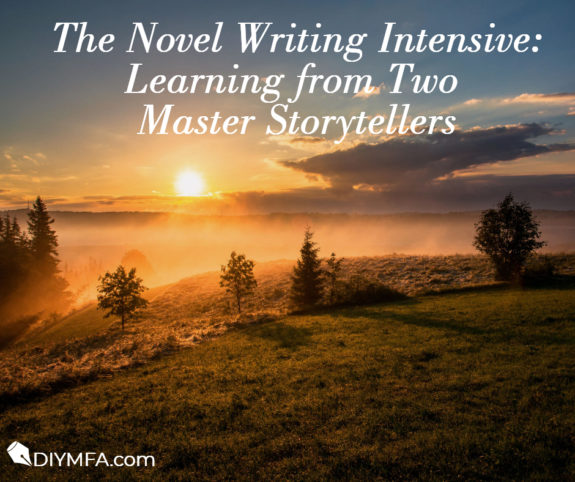In April, bestselling authors Steven James and Robert Dugoni taught the ninth Novel Writing Intensive (NWI) at the Eureka Inn, in Jonesborough, Tennessee. There were only twelve seats, and I managed to grab one before the event was waitlisted. (And I’m so glad!) It was an amazing chance to learn from two master storytellers. I left with new insights on craft and career, and wonderful friendships that will continue into the future.
What is the Novel Writing Intensive?
The Novel Writing Intensive is a retreat for writers—at any level, in any genre—to study craft and receive feedback on their writing. It consists of craft seminars, in depth critiques, career insights, and fellowship with other writers.
Seminars
The retreat had eight deep dive seminars covering scene development, plot, twists and endings, characters, tension, and setting. Each started with an overview, but then drilled down into more advanced concepts like cause and effect, micro tension, believability and causality, subtext, and how setting relates to character. I learned something new in each seminar— too many things to cover here. But I will touch on two new concepts for me—creating multi-dimensional characters through status, and creating conflict through setting.
Multi-dimensional Characters and Status
James explained in every social interaction, one person has or is vying for a higher status. Writers can show shifts from submission and dominance through dialogue, posture, pauses, communication patterns, body language, action, and thoughts.
Characters with high status may show confidence, eye contact, self-control, and courage. In contrast, a character with lower status will be arrogant, avert eye contact, lose control, and act cowardly.
Status can change based upon a situation (e.g., a man walks down the alley confronted by guys with pipes and chains, he has lower situational status), position (e.g., a teacher has higher positional status over student), or relationship (e.g., a father has higher relational status over his daughter).
Words used to describe actions can affect status too. For example, if Jane stomps across the floor (showing lack of self-control) or struts across it (implying the need for attention) she has lower status than someone who strides across it (showing composure and confidence).
The key to well-rounded characters is to make sure their status changes. James recommended during the editing process to keep in mind how we want our readers to feel about our characters and see if their actions, dialogue, gestures, and speaker attributions communicate the right level of status.
Creating Conflict Through Setting
Dugoni reminded us that plot is about a character trying to achieve a goal in the face of opposition. This opposition, or conflict, can be external (another character tries to stop the hero) and internal (some flaw in the hero’s character). But there is also a third element that is often overlooked— the environment.
Environment can be weather: a boy wants to take a girl on a picnic and it rains; a woman takes her grandson sailing and a gale blows in. But it can be also be anything non-human that conspires against the hero: an illness, a ticking clock, a baby carriage in the path of a police chase. The more extreme the opposition, the more stakes are raised. Writers consider plot and character, but often pay little attention to the environment. And it is a powerful storytelling tool.
Critiques and Career
We submitted the first fifty pages of our novels prior to the intensive and critique sessions were conducted between seminars. The class was divided in half—James took one group, Dugoni the other.
Each of us received a 75-minute detailed critique of our pages while others observed and learned from the session. Often instructors used critiques to reinforce concepts taught during seminars and then concluded with specific actions to strengthen the piece.
The instructor, who didn’t critique our pages, met with us for a one-on-one. The session was private, informal, and you could ask anything. Many of us used our time to ask career related questions.
Fellowship
With only 12 students, our class size was small and the setting intimate. Writers from around the country attended. Our backgrounds were diverse, our genres varied, and each of us were at different stages in our writing careers. (One writer had just published her 77th book.) We were the only guests at the Inn and all seminars, meals, and events occurred there. The structure fostered fellowship and an opportunity to connect and learn from each other.
Days started early in the morning and ran past dinner. One evening, Tony Marr, from The International Storytelling Center, gave a dynamic performance and reminded us how emotionally powerful good storytelling can be.
Another night, we watched movie clips that illustrated teaching points from our recent seminars. It was a great way to strengthen concepts we learned during the retreat.
When I left Tennessee, I felt encouraged and looked at my writing in a new way.
If you want an opportunity to be mentored by two amazing authors and take your writing to the next level, consider the NWI. The next session is in April 2019.
If that seems like light years away, James and Dugoni will teach at ThrillerFest in July. James also teams up with David Corbett and Susan May Warren for a Character Intensive Writing Conference in Atlanta October 26th-27th.
In the meantime, you can check out some of James’s lessons in his books, Story Trumps Structure and TroubleShooting Your Novel. His latest thriller, Every Wicked Man—the eleventh in the Bower Files series—will be available in September. Dugoni’s book, The Extraordinary Life of Sam Hell, was released in April. Both have also written articles for Writer’s Digest.
 Stacy Woodson writes romantic suspense and crime fiction. She is a U.S. Army veteran and memories of her time in the military play a role in her stories. A Daphne du Maurier winner and Publishers Weekly contributor, her recent story, “Duty. Honor. Hammett.,” will appear in Ellery Queen Mystery Magazine.
Stacy Woodson writes romantic suspense and crime fiction. She is a U.S. Army veteran and memories of her time in the military play a role in her stories. A Daphne du Maurier winner and Publishers Weekly contributor, her recent story, “Duty. Honor. Hammett.,” will appear in Ellery Queen Mystery Magazine.







